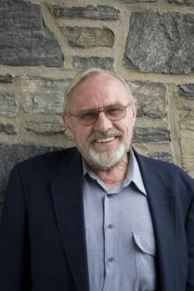In 1976, Dr. Fred Kirschenmann left his work as a dean at Curry College to return home to North Dakota. His father was recovering from a mild heart attack, and someone had to run the 3,500 acre farm that his family has had since 1930. Kirschenmann didn’t stop at taking over the operations – he was determined to convert the farm to organic cultivation, a concept one of his former students, David Vetter, introduced him to in the 1960s.

At first, crop yields dramatically declined, but through five years of trial and error they eventually recovered. Today, about a third of the farm consists of native prairie used to graze cattle, with the rest used to grow nine different grain crops in three rotations.
A farm manager recently took over the day-to-day operations in North Dakota so Kirschenmann can spend his time in Ames, Iowa where he is a distinguished fellow and former director of Iowa State University‘s Leopold Center for Sustainable Agriculture in Pocantico Hills, New York where he serves as the President of the Board for the Stone Barns Center for Food and Agriculture. Kirschenmann won a Natural Resources Defense Council‘s “Growing Green” award in 2010 for his work at Stone Barns, an 80 acre farm and educational facility.
Kirschenmann is also part of the Agriculture of the Middle project, an initiative started in 2003 to help mid-size farms that are too big to sell directly to consumers, yet too small to get involved in commodities markets, with brand development and marketing. About 80 percent of farmland in the U.S falls into this category, which Kirschenmann has called the “disappearing middle” because so many are going out of business.
Kirschenmann details how he transitioned from academic to farmer to philosopher in his book Cultivating an Ecological Conscience, a collection of essays arranged chronologically to depict, as he describes in the Preface, a “personal journey in the evolution of an ecological conscience.”
By Kim Kido

Danielle Nierenberg, an expert on livestock and sustainability, currently serves as Project Director of State of World 2011 for the Worldwatch Institute, a Washington, DC-based environmental think tank. Her knowledge of factory farming and its global spread and sustainable agriculture has been cited widely in the New York Times Magazine, the International Herald Tribune, the Washington Post, and
other publications.
Danielle worked for two years as a Peace Corps volunteer in the Dominican Republic. She is currently traveling across Africa looking at innovations that are working to alleviate hunger and poverty and blogging everyday at Worldwatch Institute’s Nourishing the Planet. She has a regular column with the Mail & Guardian, the Kansas City Star, and the Huffington Post and her writing was been featured in newspapers across Africa including the Cape Town Argus, the Zambia Daily Mail, Coast Week (Kenya), and other African publications. She holds an M.S. in agriculture, food, and environment from Tufts University and a B.A. in environmental policy from Monmouth College.








